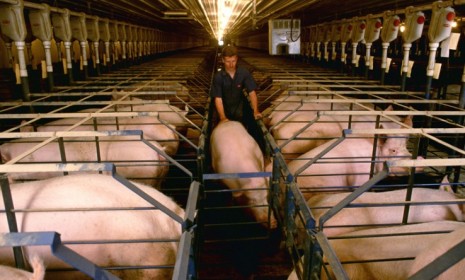McDonald's ban on tiny pig crates: A 'tipping point' for animal welfare?
The fast-food giant pleases animal-rights activists with a promise to phase controversial cages out of its supply chain

A free daily email with the biggest news stories of the day – and the best features from TheWeek.com
You are now subscribed
Your newsletter sign-up was successful
McDonald's has been the target of close scrutiny from animal-rights groups for years. But now the world's most recognizable fast-food brand is winning praise from some of its former critics for pledging to phase out the use of gestation crates for its pigs, which are used for pork products ranging from the sausage in its breakfast sandwiches to the McRib. Could such a "crate ban" set a precedent for better farming practices in the United States? Here's what you should know:
What are gestation crates?
They're tiny metal stalls that hinder a sow from turning around or moving. Many of the animals "spend not only their pregnancies in crates, but most of their lives," says Mark Bittman at The New York Times. About 90 percent of the pregnant sows in the U.S. are crammed into gestation crates. Supporters of the controversial practice say the crates keep the animals from fighting. But pigs kept in the pens are more susceptible to diseases and infections, says Paul Shapiro, a spokesman for the Humane Society of the United States, and often require additional antibiotics and medications. And pigs are "very social, intelligent animals," so immobile pigs suffer psychologically, too.
The Week
Escape your echo chamber. Get the facts behind the news, plus analysis from multiple perspectives.

Sign up for The Week's Free Newsletters
From our morning news briefing to a weekly Good News Newsletter, get the best of The Week delivered directly to your inbox.
From our morning news briefing to a weekly Good News Newsletter, get the best of The Week delivered directly to your inbox.
And now McDonalds says it'll stop using them?
That's the plan. "McDonald's believes gestation stalls are not a sustainable production system for the future," said Dan Gorsky, senior vice president of McDonald's North America Supply Chain Management, in a press release. "McDonald's wants to see the end of sow confinement in gestation stalls in our supply chain." Of course, there are "no guarantees embedded in the McDonald's announcement," says Bittman. But one of the fast-food company's biggest pork suppliers, Smithfield Foods, has promised for years that it would eliminate the use of the pens by 2017.
Why change now?
Consumers are increasingly more interested in where their food comes from, and companies like Whole Foods and Chipotle have already banned use of the gestation crates in their supply chains. Consider this latest move from McDonald's as part of a plan to "beef up its broader corporate responsibility credentials," say Emily Bryson York and Naomi Nix at the Chicago Tribune, "in which sustainability and the treatment of animals play a role." McDonald's hasn't been shy about bending to consumer wishes in the past, as evidenced by more healthful menu options in recent years.
A free daily email with the biggest news stories of the day – and the best features from TheWeek.com
What effect will this have on the industry?
It could be huge. "By setting the process in motion, McDonald's could be providing the tipping point to change in the $97 billion pork industry," say York and Nix. The McDonald's pledge, says Bittman, marks "the most significant step" toward the humane treatment of animals to date, as it's the fourth-largest pork buyer in the world. The company's new pledge could set a benchmark for raising of other farm animals, including chickens and cows. After all, in the meat industry there are only two kinds of producers: "Those who sell to McDonald's and those that wish they could."
Sources: Bloomberg, Chicago Tribune, NY Times
-
 How the FCC’s ‘equal time’ rule works
How the FCC’s ‘equal time’ rule worksIn the Spotlight The law is at the heart of the Colbert-CBS conflict
-
 What is the endgame in the DHS shutdown?
What is the endgame in the DHS shutdown?Today’s Big Question Democrats want to rein in ICE’s immigration crackdown
-
 ‘Poor time management isn’t just an inconvenience’
‘Poor time management isn’t just an inconvenience’Instant Opinion Opinion, comment and editorials of the day